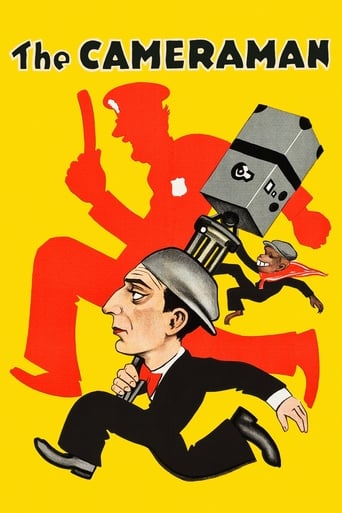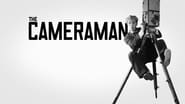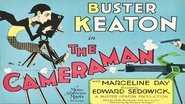mmallon4
The Cameraman is my 2nd favourite Buster Keaton feature after Sherlock Jr. A film which manages to hit every beat and even MGM themselves believed in the film enough that it became their comedy training film for new writers as the example of a perfect comedy; I can't argue with that. Like the aforementioned Sherlock Jr, The Cameraman reflects a fascination with filmmaking in which Keaton has to act like he doesn't know anything about the anatomy of a camera.Once again Keaton (playing a character conveniently called Buster) is competing for dominance and the love of a woman in a world of alpha males. What makes the relationship between Buster and love interest Sally (Marceline Day) work so well? Her sympathy, or the fact that she is one of the few people in the film who doesn't act like a complete jerk towards Buster, even the bell boy at the fictionalised MGM newsreel department is a jerk to him when Buster simply asks about the woman in his photograph despite him being a super sweet guy. Does MGM want people thinking their newsreel department is full of jerks? Or is it the little things such as her first encounter with Buster when he first bumps into her he smells her hair and goes into a trance without her noticing. You can feel the chemistry between them from their body language and even from close-ups of the two starring at each other. Likewise there is the relatability of any man who has tried to impress a girl only for his effort to be a failure by the presence of a bigger, stronger man. - Plus there is the adorable factor from seeing the two of them together. When Buster gets a kiss from Sally as he leaves her off at an apartment and then walks away in the rain with a sense of elation has Singin' In The Rain vibes; was Gene Kelly inspired by this?The Cameraman is one of those rare films which is comprised of one great moment after another. The scene in Yankee Stadium for example has no effect on the rest of the plot but there's no justification required in order to watch Keaton's athletic prowess as he pretends to play baseball by himself. Likewise the sequence on the stairs is a wonder of Keaton's ability to use the frame in what looks like to modern eyes as a 2D platforming video game. Another superb use of this comes in the pool sequence in which Sally walking by the poolside in a swimsuit then suddenly all of the men get out of the pool entering from the bottom of the frame out of nowhere. Likewise keep an eye out for the on screen nudity. This sequence also gives arise to possibly the most bizarre moment in The Cameraman in which Keaton after losing his bathing suit in the pool begins eyeing a woman wearing an excessive bathing suit and starts approaching her while Jaws-like music plays (as part of the wonderfully quirky modern score by Arthur Barrow). Off-screen he steals the suit but we never see how; just what exactly did he do to her? It's both creepy and funny at the same time. I have to ask if automobiles back then were designed for use in comedy such as an open top double decker bus which creates so many possibilities for physical comedy. However the most oddly designed vehicle present in The Cameraman has to be the 1927 LaSalle Convertible Coupe Fisher with its seat on the back of the car separate from the main seats of the vehicle. The seat is already inherently de-emasculating by itself, even worse when your girl is at the front with another guy and you're completely cut off from them because the roof is up to protect them against the rain. Oh yeah, that's another thing, when it rains you have no protection. Again I have to ask, was this vehicle designed for use in comedy?The Tong War is among one of the greatest of Keaton spectacles with its large-scale carnage and extras galore; plus I do love the fascinating underworld of the tongs and opium dens as a setting. The moment in which Keaton is confronted by gangsters and is cornered is one of those oh so glorious "how is he going to get out of this?!" moments. By the end of the film Keaton goes through so much misfortune that you badly want to see him succeed in the end. At the end he gets his sweet, satisfying revenge while the douche who takes credit for rescue Sally from the out of control speedboat gets his comeuppance. The revenge is unintentionally obtained but more than very well deserved.
Djayesse
In New York, Buster (Keaton) is a public photographer. You can get your picture taken for ten cents. While he is taking a picture, a big parade takes place: many people gather and among them, Sally (Marceline Day) a young woman who works for the News department at the MGM. The crowd is so big that he is pressed against her, smelling her perfume... After the crowd disappears, he offers to take her picture. She agrees but has to go leaving him with her photograph. When he visits her at work, he decides to be a cameraman... Then he will be able to see her anytime! But you do not become a cameraman just like that: you have to learn how to do it. First, it is an expensive job: he has to buy a camera. Even if he gets the cheapest one, he has not got any money left. Then you have to move the handle the right way: this gives a sequence where you can images moving forwards and backwards, an overprinted ship in a street, and a sequence where the picture is multiplied. A very surrealistic movie which does not please the MGM News director. But Sally still encourages him to go on. She even accepts a date with him. But things do not work as expected. Still, she gives him a last chance : go and film the Chinese New Year. You can guess how it will end... This film is Keaton's penultimate movie. The talkies are coming: The Jazz Singer was released by the Warner Bros Company. This is Keaton's swan song. There is much melancholy, and even sadness in this story. Everything falls apart. Anything he tries is a failure. Even when he wants to end it all and go back to tintypes (he sends his last film to the studio) : instead of being mocked, he is hired! Nevertheless, this film contains great scenes: the stairs, the swimming-pool, the Tong war... Moreover, Keaton teaches us a great reporting lesson: he show us how things work behind the scene. He even rearranges the fights during the Tong war (nobody does that...), but still close to the fighters, risking his own life! As I said earlier, it is his swan song. Kea ton will be less and less important in the film industry. And the last sequence has something prophetic in it: the film ends where it started, with a big parade which he thinks has been organized for him! But this was the day Lindbergh was celebrated after he crossed the Atlantic Ocean. His next movie will be Spite Marriage. Sadness and melancholy will be stronger. Meanwhile, let us enjoy this movie as it is: a very fine comedy, one of Keaton's best. So, enjoy!
bkoganbing
The Cameraman should have marked the beginning of a long and productive association with MGM for Buster Keaton. In a sense it was the high point of his career. The film came out just as sound was being introduced in the cinema. I've always thought that Keaton's deep sad voice matched his doleful countenance perfectly and sound should have made him just like it did Laurel&Hardy. But it wasn't to be for a variety of reasons.Still The Cameraman is a silent classic that suits Keaton's style perfectly. He's a tintype photographer who after a funny encounter with a bunch of newsreel cameramen decided if he can't beat them, join them. He gets a newsreel camera and tries to show what he can do. Keaton's got a double motive not just the job, but he wants to win the heart of newspaper secretary, Marceline Day.The rest of the film is a succession of gags with the camera, and poor Buster's efforts to take pictures in some perilous circumstances. He also acquires an organ grinder's monkey after first thinking he killed him. The monkey proves to be a valuable pet. Funniest sequence is when he's sent to cover the Chinese New Year celebration and two rival tongs start a war on the spot.In these days where now photographs are taken from hand held cellphones, younger viewers might not get some of the problems with the bulkiness of those old movie cameras. Keaton has some hilarious moments dealing with the contraption.For baseball fans, there are shots of old Yankee Stadium where Keaton comes to photograph the game and finds the Yankees are in St. Louis playing the Browns. I wasn't sure that it wasn't a set at first until I saw the old Jerome Avenue IRT passing during a shot as Keaton does an impromptu baseball routine before the groundskeepers throw him out. This was Yankee Stadium the year after Babe Ruth set his record of 60 home-runs.Charles Lindbergh via some newsreel footage makes a guest appearance here during the finale. Talk about dying of thirst at a reservoir, that's about what happens to Keaton. You'll have to see the film to find out what I mean.A lot of the ideas that were used in MGM's famous screwball comedy of the Thirties, Too Hard To Handle with Clark Gable, Myrna Loy, and Walter Pidgeon can be found in The Cameraman. It's a comedy classic from Buster Keaton and regretfully one of his last.
Marcin Kukuczka
Buster Keaton is deservedly considered by many people another Charlie Chaplin of the silent era. He was so unique and so genuinely magnetic in his films, in wonderful comedian roles galore that he indeed became a symbol male star of the time. Although the most famous of his silent films include THE GENERAL (1927), COPS (1922) and THE BOAT (1921), THE CAMERAMAN (1928), which had for long been feared lost, includes many of his most powerful acting pieces and moments which make this movie a truly amusing and authentic comedy.The movie presents us to the character: a cameraman so intensely sought by the people and so intensely seeking the better chance for self promotion. Buster (Buster Keaton), though so close to a great career at MGM Newsreels, meets attractive Sally (Marceline Day) and, from this moment, he does his best to impress her. It's not a deep feeling, it's just an infatuation but... we soon find him overly absorbed by the desire to be noticed and, as usually in real life, the whole situation becomes a bit hilarious...The moments are wonderfully entertaining and most of them have stood a test of time. We laugh as the viewers laughed almost 80 years ago. Who can skip hilarious scenes of Buster-Sally's date? How is it possible to maintain indifferent at the wonderful little monkey, Buster's unexpected companion, which caused such a panic in Chinatown? Also, the humorous moment at the dressing room with a "sea lion" still leads a lot of viewers to gales of laughter. These many moments make THE CAMERAMAN a real comedy with a marvelous sense of humor.The humor goes in pairs with fine cinematography and brilliant lighting, which can be admired in the restored version even more deeply. There are terrific camera shots in the movie, including the sequence on the stadium while the main character is having a rehearsal, the city shots while Buster is running in order to date with Sally, the scene at the swimming pool. And the most important factor for silents, for all movies: performances. THE CAMERAMAN is composed of truly artistic acting, but this foremost include two: Mr Keaton and Ms Day. It's no use reminding once again how terrific Keaton is. He provides a viewer with a true intellectual and a visual journey to what is going on and maintenance of curiosity as for what is going to happen. His mimics and facial gestures reach the climax of humor at the meetings with Sally. Marceline Day is subtle as Sally and very individual. Perhaps, many viewers find her far from being as good at face acting as Keaton but fits to the role in a way. These two rock and, moreover, very good job is done by the supporting cast.THE CAMERAMAN is a must see for all silent buffs and not only. If you are fed up with the naiveness of today's comedies, seek out this one and find out how wonderfully amusing a comedy may be. Yeah, this is the movie for you, it will make your day, even if this is one of those cloudiest days. Indeed, cameraman, Buster Keaton or both at the same time: you have not stopped amusing us after all these years. 9/10






